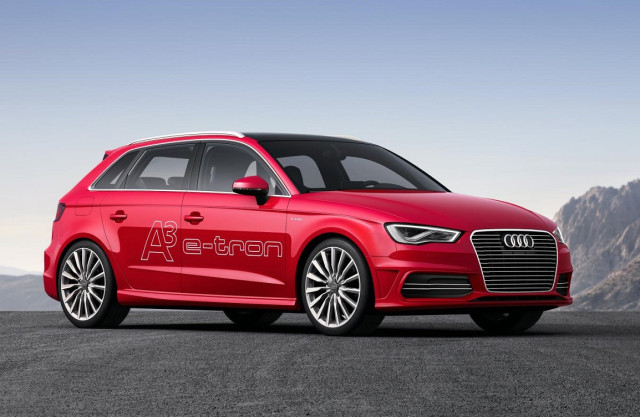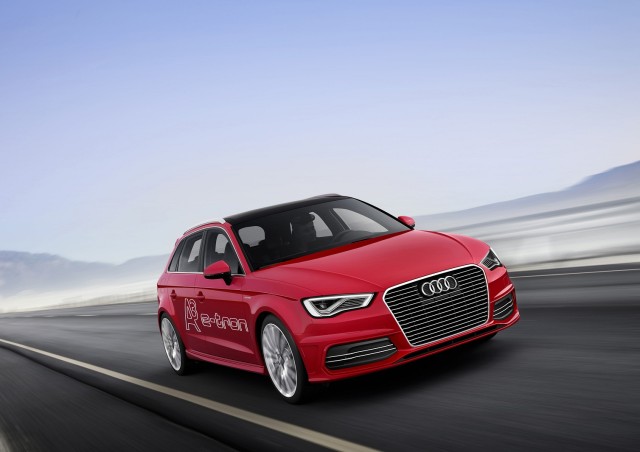


One of the strategic corporate objectives of Audi is to develop technologies that combine driving fun with sustainability. It seeks solutions that strike a balance between individual mobility on the one hand and economy, ecology and the requirements of Audi customers on the other. The models of the Audi tron family demonstrate especially well how these seemingly opposing pulls can be reconciled. g-tron stands for drive concepts that run on synthetic Audi e-gas and natural gas and achieve an excellent COâ‚‚ footprint. The first production model to pave the way for COâ‚‚-neutral long-distance mobility is the A3 Sportback g-tron. The term e-tron, on the other hand, stands for the systematic electrification of the driveline. As one outcome of its research and development projects in this area, Audi is now going into volume production with the A3 Sportback e-tron, the first premium compact car with plug-in hybrid drive.
With its plug-in hybrid concept, the A3 Sportback e-tron combines the advantages of the combustion engine with those of electric drive. The entire expertise that Audi has built up in the sphere of hybrid technology has been channeled into its concept. The parallel driveline features a 1.4 TFSI working in tandem with a powerful electric motor. The power is transmitted to the front wheels via a newly developed e-S tronic. The liquid-cooled lithium-ion battery is located ahead of the front axle; it stores 8.8 kWh of energy, enough to drive 50 kilometers (31.07 miles) purely electrically and therefore with zero local emissions.
With 150 kW (204 hp) of system power and 350 Nm of system torque (258.15 lb-ft), the Audi A3 Sportback e-tron is a sporty premium compact vehicle. It accelerates from 0 to 100 km/h (62.14 mph) in 7.6 seconds and reaches a top speed of 222 km/h (137.94 mph). The overall range is 940 kilometers (584.09 miles) and the electric range 50 kilometers (31.07 miles). Consumption measured in accordance with the ECE standard averages just 1.5 liters of fuel per 100 km (156.81 US mpg), equivalent to CO2 emissions of 35 grams per kilometer (56.33 g/mile). The A3 Sportback e-tron will go on sale from the end of 2013.

The A3 Sportback g-tron interprets the principle of sustainable mobility in a new, pioneering way. Its 1.4-liter TFSI engine runs on Audi e-gas, a synthetic fuel that in chemical terms is almost identical to natural gas and can therefore be distributed as mains natural gas. This fuel, which the brand with the four rings produces at its newly completed facility in Werlte, in the Emsland district, is CO2-neutral. Its starting components are water and carbon dioxide, and it is produced using exclusively renewable power. The A3 Sportback g-tron will be arriving at dealers before the end of this year.Motor sport is the ideal development lab for new technologies, and the toughest test environment is the 24 Hours of Le Mans. At last year’s competition on the Sarthe circuit, the R18 e-tron quattro brought Audi a historic double victory with a hybrid racecar that highlights just how much power an electrified driveline can put on the road.
In terms of its concept, the LMP-1 prototype is an uncompromising racing car, but in numerous individual areas it harbors potential that could ultimately find its way into production models The V6 TDI in the 2012 Le Mans winner supplies over 375 kW (510 hp) and 850 Nm (626.93 lb-ft) to the rear wheels. The motor-alternator unit (MAU) on the front axle is always good for 150 kW of extra thrust when accelerating out of a bend. Here it uses energy that it has captured during braking operations and stored temporarily in a flywheel energy storage system. When both electric motors on the front axle are active, the LMP-1 prototype becomes a quattro.
As well as the R18 e-tron quattro, last year Audi brought out a second high-tech car – the all-electric-drive R8 e-tron high-performance sports car. It sprints from a standstill to 100 km/h (62.14 mph) in 4.2 seconds and is governed at 200 km/h (124.27 mph). Its two electric motors supply the rear wheels with a combined 280 kW of power and 820 Nm of torque (604.80 lb-ft).
With its body made from aluminum and carbon-fiber-reinforced plastic polymer (CFRP), the multimaterial space frame of the Audi R8 e-tron is the latest manifestation of the ultra lightweight construction technology of Audi. Every facet of this high-performance sports cars demonstrates the sheer breadth of what is technically feasible. All components are systematically configured for maximum performance and range. All Audi production developments will now benefit from the expertise acquired throughout this project. There is for instance the large T‑shaped battery that doubles up as a supporting element and stores almost 49 kWh of energy, enough to drive 215 km (133.59 miles). The heat pump controls the temperature of the interior and assemblies energy-efficiently. The aerodynamics have also been optimized for maximum efficiency. The engineers of Audi have covered all key aspects of electric mobility with the R8 e-tron.
The Audi A1 e-tron is a technology demonstrator of entirely different stature. It is conceived as a specialist for urban driving. Its electric motor achieves peak output of 85 kW. The battery stores 13.3 kWh, making a operating range of 50 km (31.07 miles) possible. For longer journeys a rear-mounted combustion engine, which in its second development stage develops 25 kW (34 hp), charges up the electric motor via an alternator. Audi is participating in the German government’s “Electric Mobility Showcase” pilot project by running the A1 e-tron in six regions throughout the country in order to obtain more practical findings.
The A3 Sportback g-tron and A3 Sportback e-tron already show how diverse the Audi range of technologies for sustainable mobility is. Audi will be bringing further pioneering cars onto the market in rapid succession.











